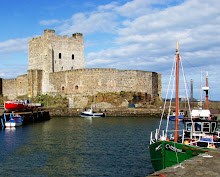
There is no political content today. At least, that is the intention as I start to write this epistle.
During the past few years our neighbor’s sons have been members of St. Thomas Episcopal School's famous pipe band. J and I attended several past performances of the school’s Scottish Festival. My Pentax K10D arrived back from repair just in time for the spectacle last Friday. Over the years I have struggled with mixed success to capture good images of the performance. I have also struggled with the whole concept of proper use of photographs of somebody else’s children. This is especially true in today’s world where it is common to post pictures on the Web. Few Web systems offer any promise that postings can ever be completely deleted. Most web pages can be indexed, cached and stored forever by Google, Yahoo or one of the other search engines. With a little effort any user can download and store images and text displayed on their computer. It is both humbling and frightening. It is humbling because these words may already have been indexed by the time that you read them. It is frightening because people who are embarrassed or hurt by the content of a web page cannot easily have that problem erased or corrected. Posting on the web might almost be the modern equivalent of carving in stone.
And so my images of the Scottish Festival are destined to remain in the dark. The images from the Pentax were much higher quality than those from the old Olympus. That was expected. They taught be a little more about what works in that mixture of dark backgrounds and intense spotlights. They also suggest a compromise – an “artistic” shot that tries to capture the color, rhythm, beauty and excitement of the evening while cloaking the individual performers in mystery. I think that will be the objective for next year.
During the past few years our neighbor’s sons have been members of St. Thomas Episcopal School's famous pipe band. J and I attended several past performances of the school’s Scottish Festival. My Pentax K10D arrived back from repair just in time for the spectacle last Friday. Over the years I have struggled with mixed success to capture good images of the performance. I have also struggled with the whole concept of proper use of photographs of somebody else’s children. This is especially true in today’s world where it is common to post pictures on the Web. Few Web systems offer any promise that postings can ever be completely deleted. Most web pages can be indexed, cached and stored forever by Google, Yahoo or one of the other search engines. With a little effort any user can download and store images and text displayed on their computer. It is both humbling and frightening. It is humbling because these words may already have been indexed by the time that you read them. It is frightening because people who are embarrassed or hurt by the content of a web page cannot easily have that problem erased or corrected. Posting on the web might almost be the modern equivalent of carving in stone.
And so my images of the Scottish Festival are destined to remain in the dark. The images from the Pentax were much higher quality than those from the old Olympus. That was expected. They taught be a little more about what works in that mixture of dark backgrounds and intense spotlights. They also suggest a compromise – an “artistic” shot that tries to capture the color, rhythm, beauty and excitement of the evening while cloaking the individual performers in mystery. I think that will be the objective for next year.


 As a friend remarked in Sunday school last week, “We are not called to change the world but we are responsible for our own actions”. So, I shall not be participating in the 2008 Olympics. I shall not watch the television coverage and I shall not buy products from companies that support the games. I know my decisions will have absolutely no affect on China’s human rights policies or how the games evolve. But I remain a true optimist. I remember how Horiatio and his two companions held the bridge and saved Rome, how the 300 Spartans helped defeat the Persian invaders and how the defenders of the Alamo bought time for Texas. Maybe, just maybe, my little gesture will encourage others and like these photographs of two different sides of the Texas story, a gesture doomed to defeat can lead to change. Maybe also, that spokesman’s comment will awaken all the presidential candidates to our nation’s real weakness - a weakness caused because we are so indebted to foreigners that we have no freedom to act as we choose.
As a friend remarked in Sunday school last week, “We are not called to change the world but we are responsible for our own actions”. So, I shall not be participating in the 2008 Olympics. I shall not watch the television coverage and I shall not buy products from companies that support the games. I know my decisions will have absolutely no affect on China’s human rights policies or how the games evolve. But I remain a true optimist. I remember how Horiatio and his two companions held the bridge and saved Rome, how the 300 Spartans helped defeat the Persian invaders and how the defenders of the Alamo bought time for Texas. Maybe, just maybe, my little gesture will encourage others and like these photographs of two different sides of the Texas story, a gesture doomed to defeat can lead to change. Maybe also, that spokesman’s comment will awaken all the presidential candidates to our nation’s real weakness - a weakness caused because we are so indebted to foreigners that we have no freedom to act as we choose. 

